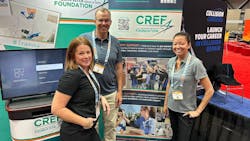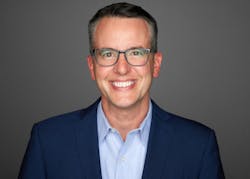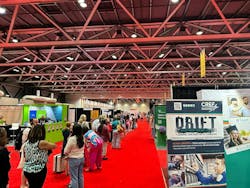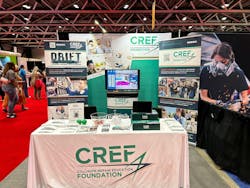To many in the collision repair industry, it can seem as if the K-12 school system, public or private, works against the trades. Telling students their only choice is going to college and dealing with the home-loan-sized student debt or flipping burgers at a fast-food chain is just one example.
The Collision Repair Education Foundation (CREF) seemed to have a different perception at the recent American School Counselors Association (ASCA) conference, which was held in mid-July in Kansas City, Missouri. Counselors met volunteers representing the collision repair trade, such as David Willett of Spark Underwriters and Becca Jackson of Classic Collision.
Although he was not present at the event, Brandon Eckenrode, the executive director of CREF, spoke with FenderBender about the importance of attending these events and what impact it could have on the industry.
What role do school counselors play in promoting collision repair education?
“They have a role in providing guidance, direction, and information to students who are in their educational career,” Eckenrode said. “Even those students in kindergarten through elementary school are interacting with these counselors and getting information about possible career paths.”
Eckenrode said he often hears complaints from other industry members that there is a negative perception that school counselors push college as the only acceptable post-graduation route for any student.
“We wanted to make sure that, instead of seeing them (school counselors) as an enemy because of that direction, we were able to engage with these counselors and showcase our industry,” he said. “The different career paths, the earning potential, and things like that, which they may or may not be aware of.
“As I think you’d agree, there’s a lot more dialogue in the national press about how college might not be the right choice for everybody. I think that’s an opportunity for this industry to make sure that we, as one of the different technical trades and industries, are seen as a viable choice for students. But also making sure that we’re getting that information out to the right people who are sharing it with the students.”
Was CREF invited to attend or was CREF in a position to ask to be part of the conference?
“A little bit of both,” he said. “Once we heard of this national body that gathers school counselors and then seeing that they have this national conference during the summer, we found opportunities at these events to present to the counselors.”
Eckenrode mentioned that on the floor of the trade show part of the event, representatives of other technical trades are also pitching their industry as an option.
Eckenrode added that the aging workforce in the collision repair industry is a contributing factor to the need for CREF to work with the ASCA.
How successful was CREF’s presence at the conference compared to other industries?
“From what I’ve heard, there was continuous interest from the counselors,” Eckenrode said. “They were eager to learn more about the industry and the support options available, such as scholarships. One key takeaway was the need for local industry members to present on behalf of the industry to students of all ages.”
What can local collision repair professionals do to help if their school district doesn’t have a program?
“I think it’s important and crucial for many schools that still have career days at their local schools where the industry shows up to those events,” he said.
“Even if they’re not looking for people,” he added. “Sometimes at our career fair events, we have companies that will participate not because they’re looking to hire the students, but they’re there to show that, ‘Hey, we are part of the industry, and we want to have you come into this industry.’
“So, I think the local industry — playing an active role in connecting with and getting involved with the local schools, even though they might not have a collision program — can still help showcase the industry, showcase the opportunities, even though those students might not be specifically in a collision repair or auto body class because the school doesn’t have it.”
What message would you like to convey to the industry about engaging with school counselors?
“It’s important for the industry to hear that I’m encouraged by the number of counselors who have come up to us at those events,” Eckenrode said. They understand that they need to embrace the technical trades more. That’s a good first step because of that willingness for them to want to learn more so that they can educate their students.”
About the Author
Abdulla Gaafarelkhalifa
Abdulla Gaafarelkhalifa is a former associate editor at FenderBender and ABRN. He has a bachelor’s degree in English from the University of Wisconsin-La Crosse and has covered various beats beyond collision repair news such as politics, education, sports, and religion. His first car was a silver 2009 Chrysler Sebring, which he nicknamed the Enterprise because he’s a Star Trek fan. He now drives a 2014 Jeep Cherokee in order to tolerate Minnesota winters.
Sign up for our eNewsletters
Get the latest news and updates




